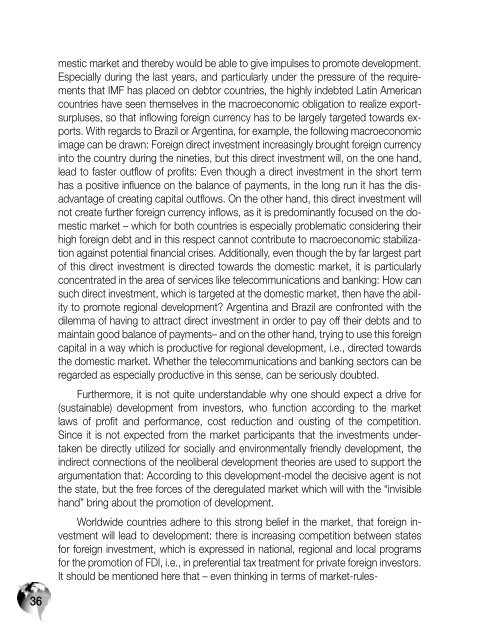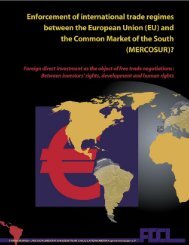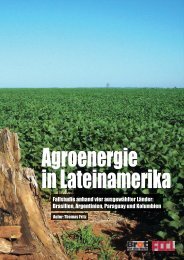(EU) and the Common Market of the South (MERCOSUR)? - FDCL
(EU) and the Common Market of the South (MERCOSUR)? - FDCL
(EU) and the Common Market of the South (MERCOSUR)? - FDCL
Create successful ePaper yourself
Turn your PDF publications into a flip-book with our unique Google optimized e-Paper software.
36<br />
mestic market <strong>and</strong> <strong>the</strong>reby would be able to give impulses to promote development.<br />
Especially during <strong>the</strong> last years, <strong>and</strong> particularly under <strong>the</strong> pressure <strong>of</strong> <strong>the</strong> requirements<br />
that IMF has placed on debtor countries, <strong>the</strong> highly indebted Latin American<br />
countries have seen <strong>the</strong>mselves in <strong>the</strong> macroeconomic obligation to realize exportsurpluses,<br />
so that inflowing foreign currency has to be largely targeted towards exports.<br />
With regards to Brazil or Argentina, for example, <strong>the</strong> following macroeconomic<br />
image can be drawn: Foreign direct investment increasingly brought foreign currency<br />
into <strong>the</strong> country during <strong>the</strong> nineties, but this direct investment will, on <strong>the</strong> one h<strong>and</strong>,<br />
lead to faster outflow <strong>of</strong> pr<strong>of</strong>its: Even though a direct investment in <strong>the</strong> short term<br />
has a positive influence on <strong>the</strong> balance <strong>of</strong> payments, in <strong>the</strong> long run it has <strong>the</strong> disadvantage<br />
<strong>of</strong> creating capital outflows. On <strong>the</strong> o<strong>the</strong>r h<strong>and</strong>, this direct investment will<br />
not create fur<strong>the</strong>r foreign currency inflows, as it is predominantly focused on <strong>the</strong> domestic<br />
market – which for both countries is especially problematic considering <strong>the</strong>ir<br />
high foreign debt <strong>and</strong> in this respect cannot contribute to macroeconomic stabilization<br />
against potential financial crises. Additionally, even though <strong>the</strong> by far largest part<br />
<strong>of</strong> this direct investment is directed towards <strong>the</strong> domestic market, it is particularly<br />
concentrated in <strong>the</strong> area <strong>of</strong> services like telecommunications <strong>and</strong> banking: How can<br />
such direct investment, which is targeted at <strong>the</strong> domestic market, <strong>the</strong>n have <strong>the</strong> ability<br />
to promote regional development? Argentina <strong>and</strong> Brazil are confronted with <strong>the</strong><br />
dilemma <strong>of</strong> having to attract direct investment in order to pay <strong>of</strong>f <strong>the</strong>ir debts <strong>and</strong> to<br />
maintain good balance <strong>of</strong> payments– <strong>and</strong> on <strong>the</strong> o<strong>the</strong>r h<strong>and</strong>, trying to use this foreign<br />
capital in a way which is productive for regional development, i.e., directed towards<br />
<strong>the</strong> domestic market. Whe<strong>the</strong>r <strong>the</strong> telecommunications <strong>and</strong> banking sectors can be<br />
regarded as especially productive in this sense, can be seriously doubted.<br />
Fur<strong>the</strong>rmore, it is not quite underst<strong>and</strong>able why one should expect a drive for<br />
(sustainable) development from investors, who function according to <strong>the</strong> market<br />
laws <strong>of</strong> pr<strong>of</strong>it <strong>and</strong> performance, cost reduction <strong>and</strong> ousting <strong>of</strong> <strong>the</strong> competition.<br />
Since it is not expected from <strong>the</strong> market participants that <strong>the</strong> investments undertaken<br />
be directly utilized for socially <strong>and</strong> environmentally friendly development, <strong>the</strong><br />
indirect connections <strong>of</strong> <strong>the</strong> neoliberal development <strong>the</strong>ories are used to support <strong>the</strong><br />
argumentation that: According to this development-model <strong>the</strong> decisive agent is not<br />
<strong>the</strong> state, but <strong>the</strong> free forces <strong>of</strong> <strong>the</strong> deregulated market which will with <strong>the</strong> “invisible<br />
h<strong>and</strong>” bring about <strong>the</strong> promotion <strong>of</strong> development.<br />
Worldwide countries adhere to this strong belief in <strong>the</strong> market, that foreign investment<br />
will lead to development: <strong>the</strong>re is increasing competition between states<br />
for foreign investment, which is expressed in national, regional <strong>and</strong> local programs<br />
for <strong>the</strong> promotion <strong>of</strong> FDI, i.e., in preferential tax treatment for private foreign investors.<br />
It should be mentioned here that – even thinking in terms <strong>of</strong> market-rules-









